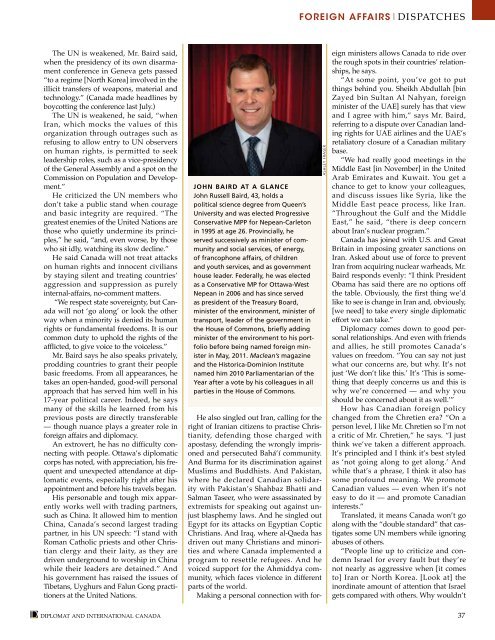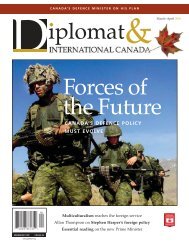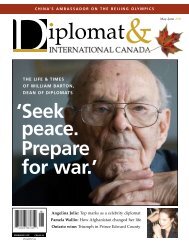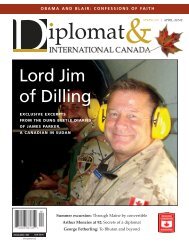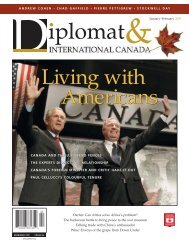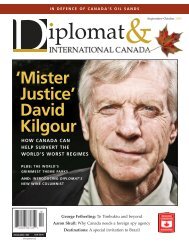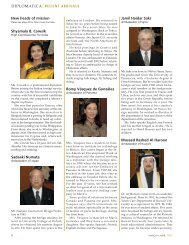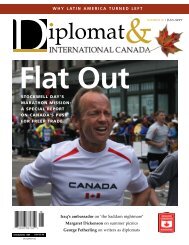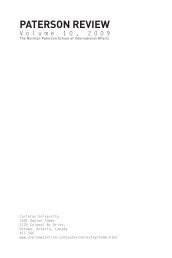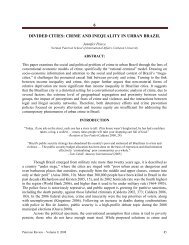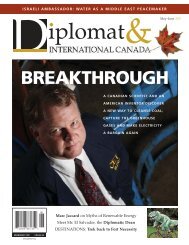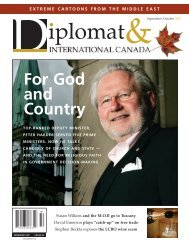John Baird: Canada's freedom agenda - Diplomat Magazine
John Baird: Canada's freedom agenda - Diplomat Magazine
John Baird: Canada's freedom agenda - Diplomat Magazine
You also want an ePaper? Increase the reach of your titles
YUMPU automatically turns print PDFs into web optimized ePapers that Google loves.
FOREIGN AFFAIRS|Di spatchesThe UN is weakened, Mr. <strong>Baird</strong> said,when the presidency of its own disarmamentconference in Geneva gets passed“to a regime [North Korea] involved in theillicit transfers of weapons, material andtechnology.” (Canada made headlines byboycotting the conference last July.)The UN is weakened, he said, “whenIran, which mocks the values of thisorganization through outrages such asrefusing to allow entry to UN observerson human rights, is permitted to seekleadership roles, such as a vice-presidencyof the General Assembly and a spot on theCommission on Population and Development.”He criticized the UN members whodon’t take a public stand when courageand basic integrity are required. “Thegreatest enemies of the United Nations arethose who quietly undermine its principles,”he said, “and, even worse, by thosewho sit idly, watching its slow decline.”He said Canada will not treat attackson human rights and innocent civiliansby staying silent and treating countries’aggression and suppression as purelyinternal-affairs, no-comment matters.“We respect state sovereignty, but Canadawill not ‘go along’ or look the otherway when a minority is denied its humanrights or fundamental <strong>freedom</strong>s. It is ourcommon duty to uphold the rights of theafflicted, to give voice to the voiceless.”Mr. <strong>Baird</strong> says he also speaks privately,prodding countries to grant their peoplebasic <strong>freedom</strong>s. From all appearances, hetakes an open-handed, good-will personalapproach that has served him well in his17-year political career. Indeed, he saysmany of the skills he learned from hisprevious posts are directly transferable— though nuance plays a greater role inforeign affairs and diplomacy.An extrovert, he has no difficulty connectingwith people. Ottawa’s diplomaticcorps has noted, with appreciation, his frequentand unexpected attendance at diplomaticevents, especially right after hisappointment and before his travels began.His personable and tough mix apparentlyworks well with trading partners,such as China. It allowed him to mentionChina, Canada’s second largest tradingpartner, in his UN speech: “I stand withRoman Catholic priests and other Christianclergy and their laity, as they aredriven underground to worship in Chinawhile their leaders are detained.” Andhis government has raised the issues ofTibetans, Uyghurs and Falun Gong practitionersat the United Nations.<strong>John</strong> <strong>Baird</strong> at a glance<strong>John</strong> Russell <strong>Baird</strong>, 43, holds apolitical science degree from Queen’sUniversity and was elected ProgressiveConservative MPP for Nepean-Carletonin 1995 at age 26. Provincially, heserved successively as minister of communityand social services, of energy,of francophone affairs, of childrenand youth services, and as governmenthouse leader. Federally, he was electedas a Conservative MP for Ottawa-WestNepean in 2006 and has since servedas president of the Treasury Board,minister of the environment, minister oftransport, leader of the government inthe House of Commons, briefly addingminister of the environment to his portfoliobefore being named foreign ministerin May, 2011. Maclean’s magazineand the Historica-Dominion Institutenamed him 2010 Parliamentarian of theYear after a vote by his colleagues in allparties in the House of Commons.Ashley FraserHe also singled out Iran, calling for theright of Iranian citizens to practise Christianity,defending those charged withapostasy, defending the wrongly imprisonedand persecuted Bahá’í community.And Burma for its discrimination againstMuslims and Buddhists. And Pakistan,where he declared Canadian solidaritywith Pakistan’s Shahbaz Bhatti andSalman Taseer, who were assassinated byextremists for speaking out against unjustblasphemy laws. And he singled outEgypt for its attacks on Egyptian CopticChristians. And Iraq, where al-Qaeda hasdriven out many Christians and minoritiesand where Canada implemented aprogram to resettle refugees. And hevoiced support for the Ahmiddya community,which faces violence in differentparts of the world.Making a personal connection with foreignministers allows Canada to ride overthe rough spots in their countries’ relationships,he says.“At some point, you’ve got to putthings behind you. Sheikh Abdullah [binZayed bin Sultan Al Nahyan, foreignminister of the UAE] surely has that viewand I agree with him,” says Mr. <strong>Baird</strong>,referring to a dispute over Canadian landingrights for UAE airlines and the UAE’sretaliatory closure of a Canadian militarybase.“We had really good meetings in theMiddle East [in November] in the UnitedArab Emirates and Kuwait. You get achance to get to know your colleagues,and discuss issues like Syria, like theMiddle East peace process, like Iran.“Throughout the Gulf and the MiddleEast,” he said, “there is deep concernabout Iran’s nuclear program.”Canada has joined with U.S. and GreatBritain in imposing greater sanctions onIran. Asked about use of force to preventIran from acquiring nuclear warheads, Mr.<strong>Baird</strong> responds evenly: “I think PresidentObama has said there are no options offthe table. Obviously, the first thing we’dlike to see is change in Iran and, obviously,[we need] to take every single diplomaticeffort we can take.”Diplomacy comes down to good personalrelationships. And even with friendsand allies, he still promotes Canada’svalues on <strong>freedom</strong>. “You can say not justwhat our concerns are, but why. It’s notjust ‘We don’t like this.’ It’s ‘This is somethingthat deeply concerns us and this iswhy we’re concerned — and why youshould be concerned about it as well.’”How has Canadian foreign policychanged from the Chretien era? “On aperson level, I like Mr. Chretien so I’m nota critic of Mr. Chretien,” he says. “I justthink we’ve taken a different approach.It’s principled and I think it’s best styledas ‘not going along to get along.’ Andwhile that’s a phrase, I think it also hassome profound meaning. We promoteCanadian values — even when it’s noteasy to do it — and promote Canadianinterests.”Translated, it means Canada won’t goalong with the “double standard” that castigatessome UN members while ignoringabuses of others.“People line up to criticize and condemnIsrael for every fault but they’renot nearly as aggressive when [it comesto] Iran or North Korea. [Look at] theinordinate amount of attention that Israelgets compared with others. Why wouldn’tdiplomat and international canada 37


